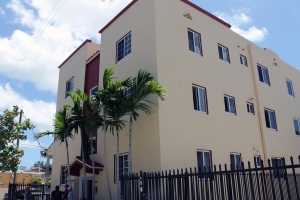FLORIDA COMMUNITY LOAN FUND EXPANDS COVERAGE OF AFFORDABLE RENTAL HOUSING ACROSS FLORIDA
The recent NEXT Opportunity Award recipient plans to deploy $25 million to fund as many as 900 apartment units to address shrinking rental inventories.
 Florida Community Loan Fund (FCLF), a statewide source of flexible financing for community and economic development, announces plans to finance multifamily rental housing that is at risk of being converted to market rate rents, thereby forcing out low-income residents.
Florida Community Loan Fund (FCLF), a statewide source of flexible financing for community and economic development, announces plans to finance multifamily rental housing that is at risk of being converted to market rate rents, thereby forcing out low-income residents.
Low-income renters in Florida are paying more than 40 percent of their total household income for housing, according to a 2013 Rental Market Study by the University of Florida's Shimberg Center for Housing Studies. The study also found that only 31 affordable rental units are available for every 100, low-income households in Florida, which amounts to a deficit of more than 315,000 units.
As Florida rental properties age, they are at risk of being lost from the rolls of affordable housing forever. Many property owners are converting their rentals to yield higher market rate rents, which can force out long-term residents who cannot afford the increase. Rental property maintenance and upgrades may also be deferred by owners who struggle to keep up with their property and debt service payments, putting them at risk of being lost to foreclosure.
"Florida's economy depends on the hard-working individuals who live in these at-risk rental units and who often cannot afford to move or pay the higher rates that most newer rental properties require," said FCLF CEO Ignacio Esteban. "With home ownership rates declining and rental rates on the upswing, housing is out of reach for a growing number of Floridians across all demographic groups."
FCLF has worked to maintain affordability of multifamily rental properties and has financed $12.1 million to preserve 429 affordable rental apartments since 2009. The organization now plans to expand its Multifamily Preservation program and has a goal to deploy $25 million to fund up to 900 apartment units, totaling as many as 30 new projects.
To date, FCLF has managed over $195 million in financing, through over 200 loans that have funded more than $670 million in community and economic development projects throughout Florida. Rio Palma Apartments in the Little Havana section of Miami is just one example of an FCLF-financed project which maintained affordable rental housing through renovation of a 1925 art-deco style building. Renovations included new high-impact windows, solar powered water heaters, new HVAC, appliances and flooring.
On September 17, 2014, FCLF became one of three community development financial institutions (CDFIs) in the U.S. to be awarded a multi-million dollar award in the Wells Fargo NEXT Awards for Opportunity Finance. The award recognizes mission-driven community lenders with innovative strategies to preserve and expand affordable housing. FCLF will receive the largest amount won by any of the three awardees – a total of $4 million which will serve as a funding source toward FCLF's $25 million deployment.
Media Contacts: Lisa Junkerman, Lisa@ChiefMarketingAssociates.com, or Janet de Guehery, janet@fclf.org.
Read a related article in the Tampa Bay Business Journal.
About Florida Community Loan Fund. Florida Community Loan Fund (FCLF) is a statewide, multifaceted financing entity providing flexible capital and expertise to improve economic and social conditions in both urban and rural communities. FCLF became Florida's first certified statewide Community Development Financial Institution in 1996 and in 2014 was one of three U.S. Community Development Financial Institutions awarded the Wells Fargo NEXT Opportunity Award which recognizes mission-driven community lenders with innovative strategies to preserve and expand affordable housing. As a lending institution, FCLF's borrowers include non-profits and for-profit mission-focused developers, housing authorities, a wide range of social service organizations, and community health centers. Investors and supporters of FCLF include financial institutions, corporations, foundations, religious communities and orders of faith, and federal and state government.

